陈述句变否定句和一般疑问句口诀和练习精编版
陈述句变一般疑问句和肯定句变否定句的几点技巧
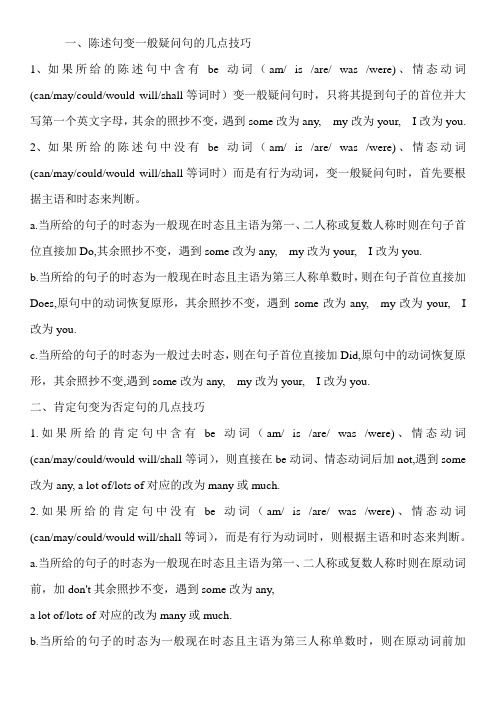
一、陈述句变一般疑问句的几点技巧1、如果所给的陈述句中含有be动词(am/ is /are/ was /were)、情态动词(can/may/could/would will/shall等词时)变一般疑问句时,只将其提到句子的首位并大写第一个英文字母,其余的照抄不变,遇到some改为any, my改为your, I改为you.2、如果所给的陈述句中没有be动词(am/ is /are/ was /were)、情态动词(can/may/could/would will/shall等词时)而是有行为动词,变一般疑问句时,首先要根据主语和时态来判断。
a.当所给的句子的时态为一般现在时态且主语为第一、二人称或复数人称时则在句子首位直接加Do,其余照抄不变,遇到some改为any, my改为your, I改为you.b.当所给的句子的时态为一般现在时态且主语为第三人称单数时,则在句子首位直接加Does,原句中的动词恢复原形,其余照抄不变,遇到some改为any, my改为your, I 改为you.c.当所给的句子的时态为一般过去时态,则在句子首位直接加Did,原句中的动词恢复原形,其余照抄不变,遇到some改为any, my改为your, I改为you.二、肯定句变为否定句的几点技巧1.如果所给的肯定句中含有be动词(am/ is /are/ was /were)、情态动词(can/may/could/would will/shall等词),则直接在be动词、情态动词后加not,遇到some 改为any, a lot of/lots of对应的改为many或much.2.如果所给的肯定句中没有be动词(am/ is /are/ was /were)、情态动词(can/may/could/would will/shall等词),而是有行为动词时,则根据主语和时态来判断。
a.当所给的句子的时态为一般现在时态且主语为第一、二人称或复数人称时则在原动词前,加don't其余照抄不变,遇到some改为any,a lot of/lots of对应的改为many或much.b.当所给的句子的时态为一般现在时态且主语为第三人称单数时,则在原动词前加doesn't原句中的动词恢复原形,其余照抄不变,遇到some改为any,a lot of/lots of对应的改为many或much.c.当所给的句子的时态为一般过去时态,则在原动词前加didn't原句中的动词恢复原形,其余照抄不变,遇到some改为any,a lot of/lots of对应的改为many或much.将下列句子变为一般疑问句和否定句1. His father is an English teacher.2. These cats are crying.3. They can swim.4. I like to read English.5. I go to school on foot.6. He likes English.7. His father goes to work by bus.8. He is crying under the tree.9. His birthday is on the twentieth of November.10. Mrs. Li and Kitty are in a big shop.11. Kitty is wearing her new uniform.12. The boy under the tree is hungry.13. He goes to school every day.14. I want to have a model car.15.She wants a cup of coffee.16. Mrs. Li and Kitty watch television at night.17. I do my homework after school.。
陈述句变一般疑问句的口诀
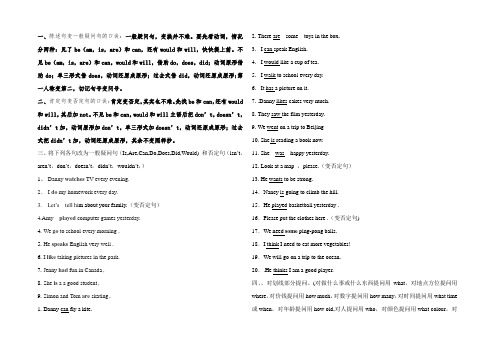
一、陈述句变一般疑问句的口诀:一般疑问句,变换并不难。
要先看动词,情况分两种:见了be(am,is,are)和can,还有would和will,快快提上前。
不见be(am,is,are)和can,would和will,借助do,does,did;动词原形借助do;单三形式借does,动词还原成原形;过去式借did,动词还原成原形;第一人称变第二,切记句号变问号。
二、肯定句变否定句的口诀:肯定变否定,其实也不难。
先找be和can,还有would 和will,其后加not。
不见be和can,would和will主语后把don’t,doesn’t,didn’t加,动词原形加don’t,单三形式加doesn’t,动词还原成原形;过去式把didn’t加,动词还原成原形,其余不变照样抄。
三、将下列各句改为一般疑问句(Is,Are,Can,Do,Does,Did,Would) 和否定句(isn’t,aren’t,don’t,doesn’t,didn’t,wouldn’t,)1、Danny watches TV every evening.2、I do my homework every day.3. Let’s tell hi m about your family.(变否定句)4.Amy played computer games yesterday.4.We go to school every morning .5.He speaks English very well .6.I like taking pictures in the park.7.Jenny had fun in Canada。
8.She is a a good student。
9.Simon and Tom are skating。
1.Danny can fly a kite.2.There are some toys in the box.3.I can speak English.4.I would like a cup of tea.5.I walk to school every day.6.It has a picture on it.7..Danny likes cakes very much.8.They saw the film yesterday.9.We went on a trip to Beijing10.She is reading a book now.11.She was happy yesterday.12.Look at a map ,please.(变否定句)13.He wants to be strong.14.Nancy is going to climb the hill.15.He played basketball yesterday .16.Please put the clothes here .(变否定句)17.We need some ping-pong balls.18.I think I need to eat more vegetables!19.We will go on a trip to the ocean.20..He thinks I am a good player.四、、对划线部分提问。
英语中陈述句变一般疑问句的口诀

英语中陈述句变一般疑问句的口诀
1. 有 be 动词就把 be 动词提前呀,就像“She is a student.”变成“Is she a student?”,这不是很简单嘛!
2. 没 be 动词找助动词呀,你看“I like apples.”不就可以变成“Do you like apples?”,多容易呀!
3. 一二人称要互换哦,比如说“You are my friend.”变成“Am I your friend?”,是不是很神奇呀!
4. 句首大写别忘掉呀,“He goes to school.”变成“Does he go to school?”,可别马虎啦!
5. 动词还原要记清呢,“They played football.”变成“Did they play football?”,这可不能错哟!
6. 特殊情况特殊记呀,像“What's this?”就不能再变啦,记住没?
7. 多读几遍就熟练啦,“It is sunny.”变成“Is it sunny?”,多念几遍就会啦!
8. 平时练习多用心呀,“We have a book.”变成“Do we have a book?”,用心就能掌握哟!
9. 别嫌麻烦慢慢来呀,“She can dance.”变成“Can she dance?”,一步一步来嘛!
10. 掌握口诀超厉害的哟,“He has a pen.”变成“Does he have a pen?”,厉害吧!
我的观点结论就是:只要记住这些口诀,陈述句变一般疑问句就一点都不难啦,大家加油呀!。
小学英语变一般疑问句和否定句的小口诀
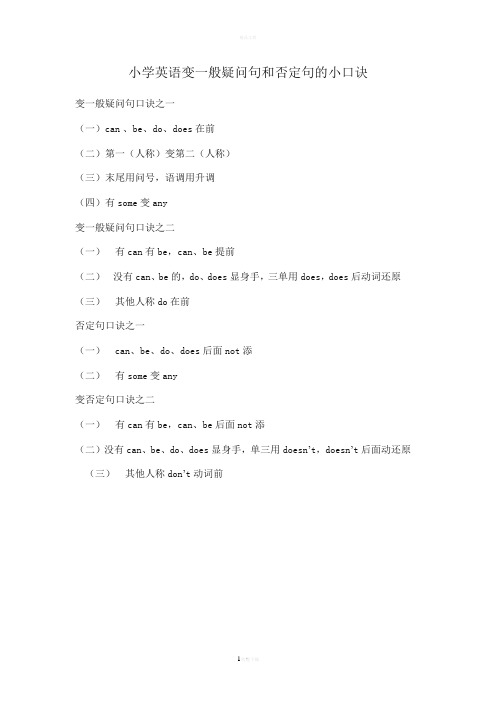
小学英语变一般疑问句和否定句的小口诀
变一般疑问句口诀之一
(一)can、be、do、does在前
(二)第一(人称)变第二(人称)
(三)末尾用问号,语调用升调
(四)有some变any
变一般疑问句口诀之二
(一)有can有be,can、be提前
(二)没有can、be的,do、does显身手,三单用does,does后动词还原(三)其他人称do在前
否定句口诀之一
(一)can、be、do、does后面not添
(二)有some变any
变否定句口诀之二
(一)有can有be,can、be后面not添
(二)没有can、be、do、does显身手,单三用doesn’t,doesn’t后面动还原(三)其他人称don’t动词前
欢迎您的下载,
资料仅供参考!
致力为企业和个人提供合同协议,策划案计划书,学习资料等等
打造全网一站式需求。
陈述句变否定句一般疑问句特殊疑问句及练习全面
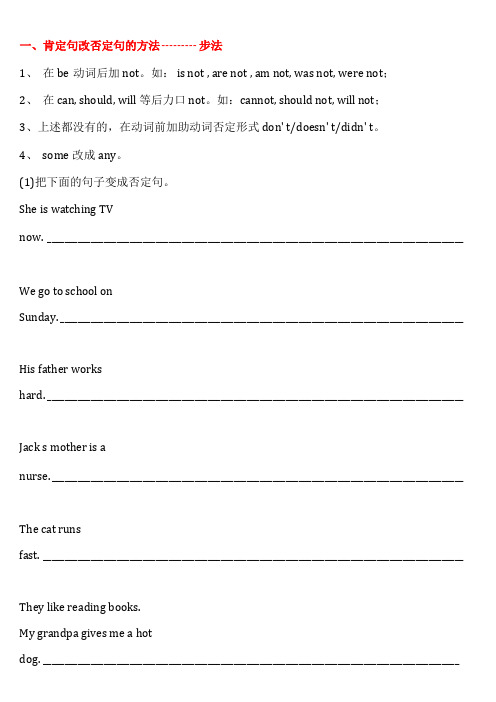
一、肯定句改否定句的方法--------- 步法1、在be动词后加not。
如: is not , are not , am not, was not, were not;2、在 can, should, will 等后力口 not。
如:cannot, should not, will not;3、上述都没有的,在动词前加助动词否定形式don' t/doesn' t/didn' t。
4、some 改成any。
(1)把下面的句子变成否定句。
She is watching TVnow. ________________________________________________________________________________________________We go to school onSunday. _____________________________________________________________________________________________His father workshard. ________________________________________________________________________________________________Jack s mother is anurse. _______________________________________________________________________________________________The cat runsfast. _________________________________________________________________________________________________They like reading books.My grandpa gives me a hotdog. ________________________________________________________________________________________________Tom often walks toschool. _____________________________________________________________________________________________I have adoll. ________________________________________________________________________________________________It is eatingfish. ________________________________________________________________________________________________二、肯定句改一般疑问句的方法一一三步法1、把be动词放在句首,剩下的照抄,(some改成any, my改成your等)句点改成问号。
英语陈述句变一般疑问句口诀(5篇)
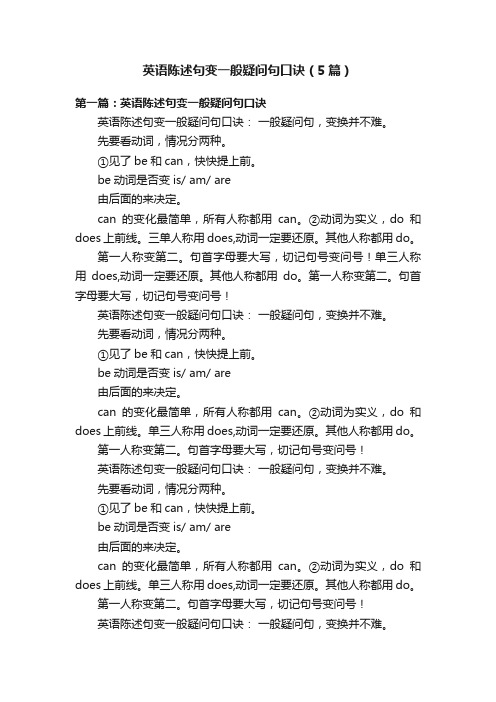
英语陈述句变一般疑问句口诀(5篇)第一篇:英语陈述句变一般疑问句口诀英语陈述句变一般疑问句口诀:一般疑问句,变换并不难。
先要看动词,情况分两种。
①见了be和can,快快提上前。
be动词是否变is/ am/ are由后面的来决定。
can的变化最简单,所有人称都用can。
②动词为实义,do和does上前线。
三单人称用does,动词一定要还原。
其他人称都用do。
第一人称变第二。
句首字母要大写,切记句号变问号!单三人称用does,动词一定要还原。
其他人称都用do。
第一人称变第二。
句首字母要大写,切记句号变问号!英语陈述句变一般疑问句口诀:一般疑问句,变换并不难。
先要看动词,情况分两种。
①见了be和can,快快提上前。
be动词是否变is/ am/ are由后面的来决定。
can的变化最简单,所有人称都用can。
②动词为实义,do和does上前线。
单三人称用does,动词一定要还原。
其他人称都用do。
第一人称变第二。
句首字母要大写,切记句号变问号!英语陈述句变一般疑问句口诀:一般疑问句,变换并不难。
先要看动词,情况分两种。
①见了be和can,快快提上前。
be动词是否变is/ am/ are由后面的来决定。
can的变化最简单,所有人称都用can。
②动词为实义,do和does上前线。
单三人称用does,动词一定要还原。
其他人称都用do。
第一人称变第二。
句首字母要大写,切记句号变问号!英语陈述句变一般疑问句口诀:一般疑问句,变换并不难。
先要看动词,情况分两种。
①见了be和can,快快提上前。
be动词是否变is/ am/ are由后面的来决定。
can的变化最简单,所有人称都用can。
②动词为实义,do和does上前线。
第二篇:陈述句变一般疑问句解题方法陈述句变一般疑问句解题方法(自创儿歌)鱼的英语备课室 2008-11-14 22:18:10 阅读284 评论2 字号:大中小订阅陈述句变一般疑问句解题方法儿歌:陈述变疑问,方法很简单。
陈述句变疑问句和否定句

1.The twins are watching TV now. The twins are not(aren’t) watching TV now. 2.They were in the front of the classroom. They were not(weren’t) in the front of the classroom. 3.The child can play the piano very well. The child can not(can’t)play the piano very well. 4.We students should help each other in study . We students should not(shouldn’t) help each other in study.
陈述句变一般疑问句和否定句 步 骤
一、变一般疑问句
第一种情况: 当句中谓语动词含有系动词(is/am/are/was/were)或者是 情态动词( can/may/must/should/would/could/will/shall/need )时, 应该先在该系动词或者情态动词直接提到句首, 然后在句尾加“?” 当句中含有第一人称的代词时,在改为问句后 注意: 应该改为与此相应的第二人称(系动词的变化).
1.We always go to school on foot every day. We always don’t go to school on foot every day. 2.They went to the hospital to see their good friend, Tom. They didn’t go to the hospital to see their good friend ,Tom. 3.My good friend has two eggs and a glass of milk in the morning before he goes to school. My good friend doesn’t have two eggs or a glass of milk in the morning before he doesn’t go to school .
英语陈述句变一般疑问句口诀
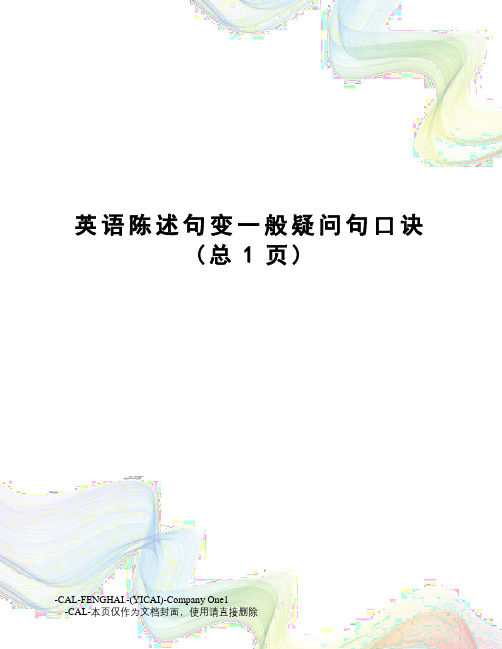
英语陈述句变一般疑问句口诀(总1页)-CAL-FENGHAI.-(YICAI)-Company One1-CAL-本页仅作为文档封面,使用请直接删除英语陈述句变一般疑问句口诀:一般疑问句,变换并不难。
先要看动词,情况分两种。
①见了be和can,快快提上前。
be动词是否变is/ am/ are由后面的来决定。
can的变化最简单,所有人称都用can。
②动词为实义,do和does上前线。
三单人称用does,动词一定要还原。
其他人称都用do。
第一人称变第二。
句首字母要大写,切记句号变问号!英语陈述句变一般疑问句口诀:一般疑问句,变换并不难。
先要看动词,情况分两种。
①见了be和can,快快提上前。
be动词是否变is/ am/ are由后面的来决定。
can的变化最简单,所有人称都用can。
②动词为实义,do和does上前线。
单三人称用does,动词一定要还原。
其他人称都用do。
第一人称变第二。
句首字母要大写,切记句号变问号!英语陈述句变一般疑问句口诀:一般疑问句,变换并不难。
先要看动词,情况分两种。
①见了be和can,快快提上前。
be动词是否变is/ am/ are由后面的来决定。
can的变化最简单,所有人称都用can。
②动词为实义,do和does上前线。
单三人称用does,动词一定要还原。
其他人称都用do。
第一人称变第二。
句首字母要大写,切记句号变问号!英语陈述句变一般疑问句口诀:一般疑问句,变换并不难。
先要看动词,情况分两种。
①见了be和can,快快提上前。
be动词是否变is/ am/ are由后面的来决定。
can的变化最简单,所有人称都用can。
②动词为实义,do和does上前线。
单三人称用does,动词一定要还原。
其他人称都用do。
第一人称变第二。
句首字母要大写,切记句号变问号!2。
- 1、下载文档前请自行甄别文档内容的完整性,平台不提供额外的编辑、内容补充、找答案等附加服务。
- 2、"仅部分预览"的文档,不可在线预览部分如存在完整性等问题,可反馈申请退款(可完整预览的文档不适用该条件!)。
- 3、如文档侵犯您的权益,请联系客服反馈,我们会尽快为您处理(人工客服工作时间:9:00-18:30)。
否定句变换口诀
1. 变否定,找be、 can , be、can后边加not,
2. 无be无can找动词,动词前边加don't/doesn’t,后面动
词用原形。
【典型例题】
1. David watches TV every evening.(改为否定句)
2. She is buying some food in the supermarket(改为否定句)
3. He can play the piano.(改为否定句)
一般疑问句变换口诀
1. 一般问,找be、 can , be、 can提前用问号;
2. 无be无can借用do(三单does), 放到句首要大写。
【典型例题】
1. This is my toy car.(改为一般疑问句)
2. He can play basketball.(改为一般疑问句)
3. Jack speaks English very well. (改为一般疑问句)
对划线部分部提问口决
划线问,先把原句变疑问,找准特殊疑问词,放在句首去划线,动词词组do 代替,时态人称要注意。
【典型例题】
1. The children are flying kites in the park. (对画线部分提问)
2. There are ten books in the bag.(对画线部分提问)
3. She is a nurse. (对画线部分提问)
一、按要求完成句子(要求:A:改为一般疑问句 B:改为否定句)
1. I am a student.→A: B:
2. They are English cars. →A: B:
3. This is a pencil-box. →A: B:
4. Its name is Polly. →A: B:
5. Jim is at school. →A: B:
6. These are my English books. →A: B:
7. I know his name. →A: B:
8. Please look after your cat. →A: B:
9. There is some money in the purse. →A: B:
10. There are many apples on the tree. →A: B:
11. You can go to have a look. →A: B:
12. Come here, please. →A: B:
二、回答句子(A:肯定回答 B:否定回答)
1. Are you a teacher? →A: B:
2. Is this your ruler? →A: B:
3. Are those banana trees? →A: B:
4. Is it a nice room? →A: B:
5. Is there a picture on the wall? →A: B:
6. Are there any trees on the hill? →A: B:
7. Can you see a bird in the sky? →A: B:
8. Do you know Mr Wang? →A: B:
陈述句变一般疑问句
1. His father is an English teacher.
_________________________________________ ?
2. These cats are crying.(喊叫)
_________________________________________ ?
3. They can swim.
_________________________________________ ?
4. I like to read(阅读) English.
_________________________________________ ?
5. I go to school on foot.(走路)
_________________________________________ ?
6. He likes English.
_________________________________________ ?
7. His father goes to work by bus.(乘公共汽车)
_________________________________________ ?
8. He is crying(哭) under the tree.
_________________________________________ ?
9. The boy does some housework(家庭作业) at home.
_________________________________________ ?
10. The children had a good time in the park(公园).
_________________________________________ ?。
